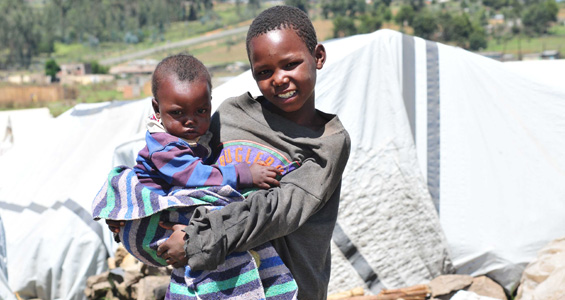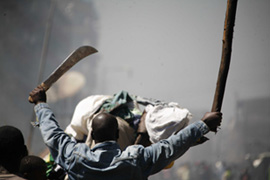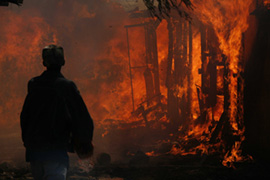Kenyans doubt promise of justice
Some victims of the post-election violence say they are still afraid to speak out.

 |
| Many of the 10,000 victims of violence who are still living in IDP camps are afraid to return home [BONIFACE MWANGI] |
During his five-day visit to Kenya to investigate the country’s 2007-08 post-election violence, Luis Moreno-Ocampo, the chief prosecutor of the International Criminal Court at The Hague, met with some its victims – 10,000 of whom still live in internally displaced persons (IDP) camps.
Many of those he met live in Nairobi’s Mathare and Kibera slums – the scene of much of the violence that erupted after Mwai Kibaki, the president, declared victory amid accusations by opposition supporters that the poll had been rigged.
The ensuing weeks of violence left more than 1,133 people dead, forced 400,000 to flee their homes and brought Kenya to the brink of civil war.
‘Lost everything’
 |
| Grace thinks the investigation will not change the culture of impunity [BONIFACE MWANGI] |
In Kibera, Grace Odek was unaware of Moreno-Ocampo’s presence in her neighbourhood.
“I would have loved to meet him and talk to him. We suffered a lot. I lost everything I had and was just left with the clothes that my children and I were wearing,” she says.
“My life has become more difficult for no fault of mine, and no one has paid for it.”
Grace is a single mother of eight and, like her two youngest children, has HIV.
“Feeding my children has become twice the struggle. I had a small business before the election violence when my stall was burnt down. Then I could at least afford to feed my children. Today, we sometimes live through a day on a mug of porridge.”
Grace and her eight children live in a one-room mud shack. She earns a living by doing household chores in the wealthier neighbourhoods around Kibera at the weekends and by selling earrings and other trinkets she makes on weekdays.
She is not optimistic that justice will be delivered soon.
“I will not wait to loose all my things in the coming elections of 2012,” she says.
“I know the same things will happen. I will take all my children and go to my ancestral home. I will not even waste my time voting. All this happened, because I voted in the first place.”
During the final press conference of his trip, Moreno-Ocampo sought to reassure those, who like Grace, believe justice will remain elusive.
“There will be justice,” he said.
“I will conduct two investigations, selecting the most serious crimes committed and the most responsible for those crimes for prosecution. I will follow the law and will not be swayed by politics.”
‘Too risky’
| in depth | |||||||||||||||
|
At the other end of town in the Mathare slum, Kanu Kioko knew of Moreno-Ocampo’s visit to his neighbourhood but chose to stay away.
He feared the possible consequences of talking to the chief prosecutor.
“I was aware that Moreno-Ocampo was coming here,” he says.
“But I could not even dare to go anywhere near where that meeting was taking place. It is too risky for me.
“You never know who might be there watching and listening, coming back for me later.”
Kanu had his left hand chopped off at the height of the violence that pitted one tribe against another.
He does not know the people who cut off his hand, but it changed his life and he can no longer earn a living.
“I know this ghetto,” he says, referring to the Mathare slum. “It would be too dangerous to talk too much and continue living here.
“It is easy for people like Moreno-Ocampo who come here for a day and then go – or even for journalists. No one will come after you. But it is different for me.”
‘Government duty’
 |
| A man races a club and machete during the post-election violence [BONIFACE MWANGI] |
Kanu’s fears are not unfounded. A lot of the victims have reported receiving threats in recent times – some allegedly from powerful politicians and businessmen who are afraid of being implicated for their role in the violence.
And with high-ranking government and state security officials suspected of being among those being investigated – Moreno-Ocampo has said that political leaders organised and financed the attacks on civilians – Kenyans doubt the government’s ability to offer protection to witnesses.
The chief prosecutor’s statements have offered little to alleviate such doubts.
“My court will protect those we choose to be witnesses in the cases that we present,” Moreno-Ocampo said. “But they are only about 30 or 40. These are the only ones we can protect.
“But it is the duty of the Kenyan government to protect all the other 400,000 victims of the poll violence so that they do not suffer from further intimidation. But I can not offer everyone protection. It is not my job to do so.”
The Kenya National Commission on Human Rights (KNCHR), one of the organisations that have carried out initial investigations into the violence, says it is protecting some of the victims but that it can offer only a minimal level of protection.
“As a human rights commission, we have an obligation to offer some level of protection to the witnesses,” says Hassan Omar Hassan, the KNCHR vice-chairman.
“But this is not really under the witness protection programme, which can only be done by the government. Ours is to only offer some minimum intervention and keep the witnesses out of harm’s way in the interim.
“It is likely that some of those we are protecting might serve as witnesses in Moreno-Ocampo’s cases.”
Changing political landscape
 |
| Houses burn in the Kibera slum during the post-election violence [BONIFACE MWANGI] |
Moreno-Ocampo has promised to return to Kenya later in the year.
“I came here to talk to the witnesses, but I shall be back to present the findings of my investigations.”
Many in Kenya suspect that Moreno-Ocampo’s visit and ongoing investigation will change the country’s political landscape, but views differ over whether or not it will be for the better.
Some fear that if an arrest warrant is issued for a tribal warlord, fresh rounds of violence will result.
But Omar Hassan says the investigation “can only be good for Kenya”.
“This is the first major step towards combating impunity. Whatever happens, there will be pressure to reform the judicial and the legal system of this country,” he says.
Grace and Kanu say it will take more than another visit and words of reassurance to enable them to start believing in justice.
And as Moreno-Ocampo told the Kenyan government, justice should start now:
“You do not have to wait for an ICC decision to house those that are still in camps or to help the women who were raped and still need medical care,” he said.
“You can do that now. I believe we can do more for the victims now.”
